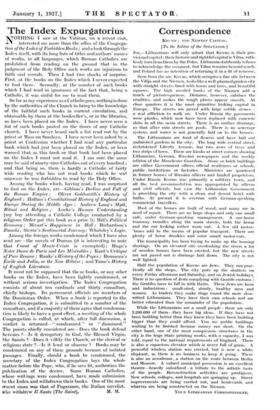Correspondence
KOVNO : THE NEWEST CAPITAL.
[To the Editor of the SPECTATOR.] Sin,—Lithuanians will only admit that Kovno is their pro- vitiional capital ; their historic and rightful capital is Vilna, ruth- lessly torn from them by the Poles. Lithuania stubbornly refuses to acknowledge the conquest, but Vilna remains beyond reach, and Poland has no intention of returning it in a fit of remorse.
Seen from the air, Kovno, which occupies a fine site between the Vilija and the Niemen, looks like a well-planned garden city with straight streets, lined with lawns and trees, and beautiful squares. The high wooded banks of the Niemen add a touch of picturesqueness. Distance, however, subdues the crudities, and makes the rough places appear smooth. At close quarters it is the most primitive looking capital in Europe. The streets are paved with large cobble stones— a real affliction to walk on. Under Russia the pavements were planks, which now have been replaced with concrete slabs in all the main streets. There is no surface drainage, so that after rain streets are pools. There is no sewerage system, and water is not generally laid on to the houses.
The Lithuanians are fond of flowers and have laid out unfinished gardens in the city. The long wide central street, rechristened Liberty Avenue, has two rows of trees and two strips of lawn. There are kiosks at street corners showing Lithuanian, German, Russian newspapers and the weekly edition of the Manchester Guardian. Stone or brick buildings are either Government offices, official residences or schools, public institutions or factories. Ministries are quartered in former houses of Russian officers and landed proprietors. Under Russia Kovno was primarily a military town, and all the best accommodation was appropriated by officers and civil officials, but COW the Lithuanian Government is providing the city with a clean and decent hotel with baths. At present it is overrun with German-speaking commercial travellers.
Most of the houses are built of wood, and many are in need of repair. There arc no large shops and only one small café, under German-speaking management. A one-horse tramway trundles along the main streets, both the horse and the car looking rather worn out. A few old motor- 'buses add to the means of popular transport. There are plenty of horse drozkics and some smart motor-cars.
The municipality has been trying to make up the housing shortage. On an elevated site overlooking the rivers a lot of wooden houses have been erected, but the new streets are not paved nor is drainage laid down. The city is not well lighted.
Half the population of Kovno are Jews. They run prac- tically all the shops. The city puts up the shutters on every Friday afternoon and Saturday, and on Jewish holidays. There is no question of Jews complying with Gentile customs : the Gentiles have to fall in with theirs. These Jews are keen and industrious : small-sized, sturdy, healthy men and women. As traders they make rings round the more slow- witted Lithuanians. They have their own schools and are better educated than the remainder of the population.
While the Lithuanians are a small people—there are only 2,200,000 of them—they have big ideas. If they have not been building better than they knew they have been building bigger than they could afford. You see public buildings waiting to be finished because money ran short. On the other hand, one of the most conspicuous structures in the city is the huge State printing works, with a capacity, I was told, equal to the national requirements of England. There is also a capacious elevator which is never full of grain. A powerful wireless station was erected, but is now a white elephant, as there is no business to keep it going. There is also an aerodrome, a station on the route between Berlin and Moscow. A valued municipal possession is an excellent theatre—heavily subsidized—a tribute to the artistic taste of the people. Reconstruction activities are prodigious. New schools, colleges, and hospitals are springing up. Street improvements are being carried out, and boulevards and wharves are being constructed on the Niemen.
YOUR LITHUANIAN CORRESPONDENT.


































 Previous page
Previous page